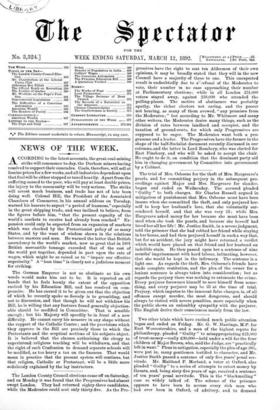The trial of Mrs. Osborne for the theft of Mrs.
Hargreave's pearls, and for committing perjury in the subsequent pro- ceedings against Major and Mrs. Hargreave for slander, began and ended on Wednesday. The accused pleaded " Guilty " to both charges. Sir Charles Russell argued in mitigation of punishment that Mrs. Osborne must have been insane when she committed the theft, and only perjured her- self to keep her husband's love, that she voluntarily sur- rendered herself, and that she was very ill ; while Mrs. Hargreave asked mercy for her because she must have been mad when she took the pearls, and because she herself had loved her all her life ! Mr. Justice Smith, in a severe judgment, told the prisoner that she had robbed her friend while staying in her house, and had then perjured herself in such a way that, but for an accident, the jury might have returned a verdict which would have placed on that friend and her husband an indelible stain. He then passed upon her a sentence of nine months' imprisonment with hard labour, intimating, however, that she would be kept in the infirmary. The sentence is a light one. As regards the theft, Mrs. Osborne's friends have made complete restitution, and the plea of the owner for a lenient sentence is always taken into consideration ; but as regards the perjury there was nothing to extenuate the crime. Every perjurer forswears himself to save himself from some- thing, and every perjurer may be ill at the time of trial. Perjury, which imputes to the innocent false charges, is, of all offences except murder, the most dangerous, and should always be visited with severe penalties, more especially when the public shows an unhealthy sympathy with the perjurer. The English derive their consciences mainly from the law.


































